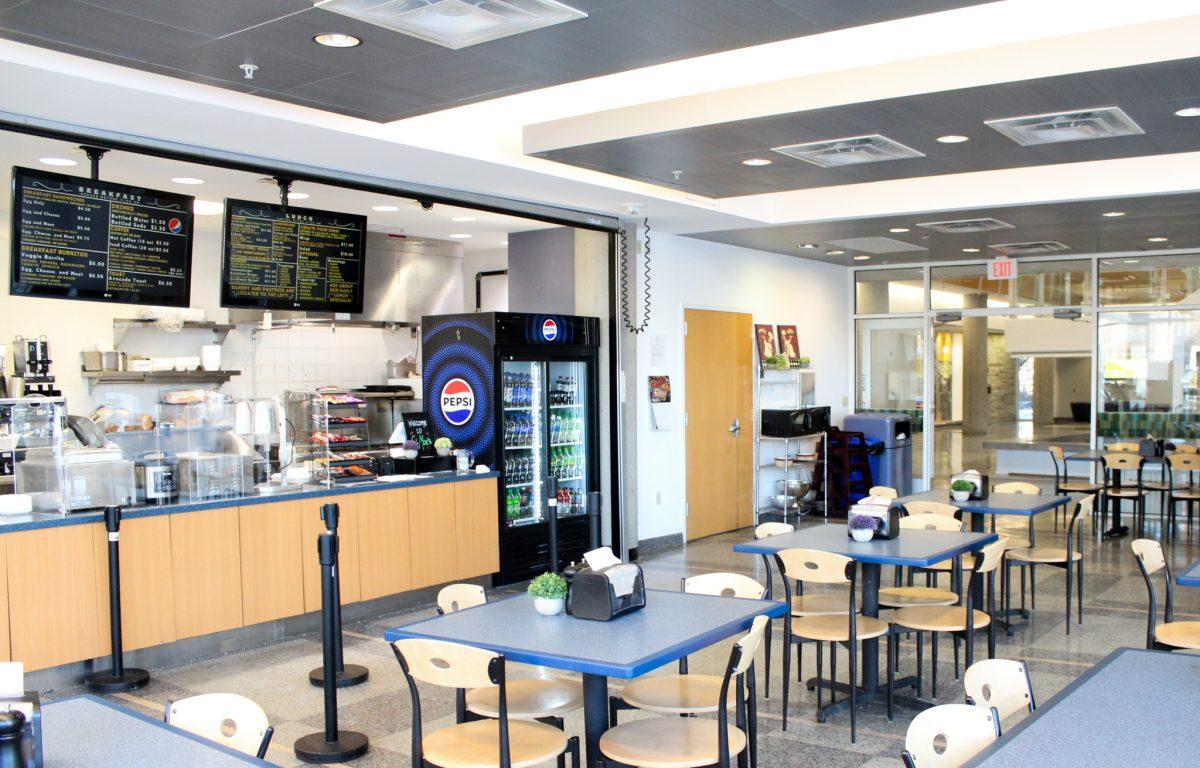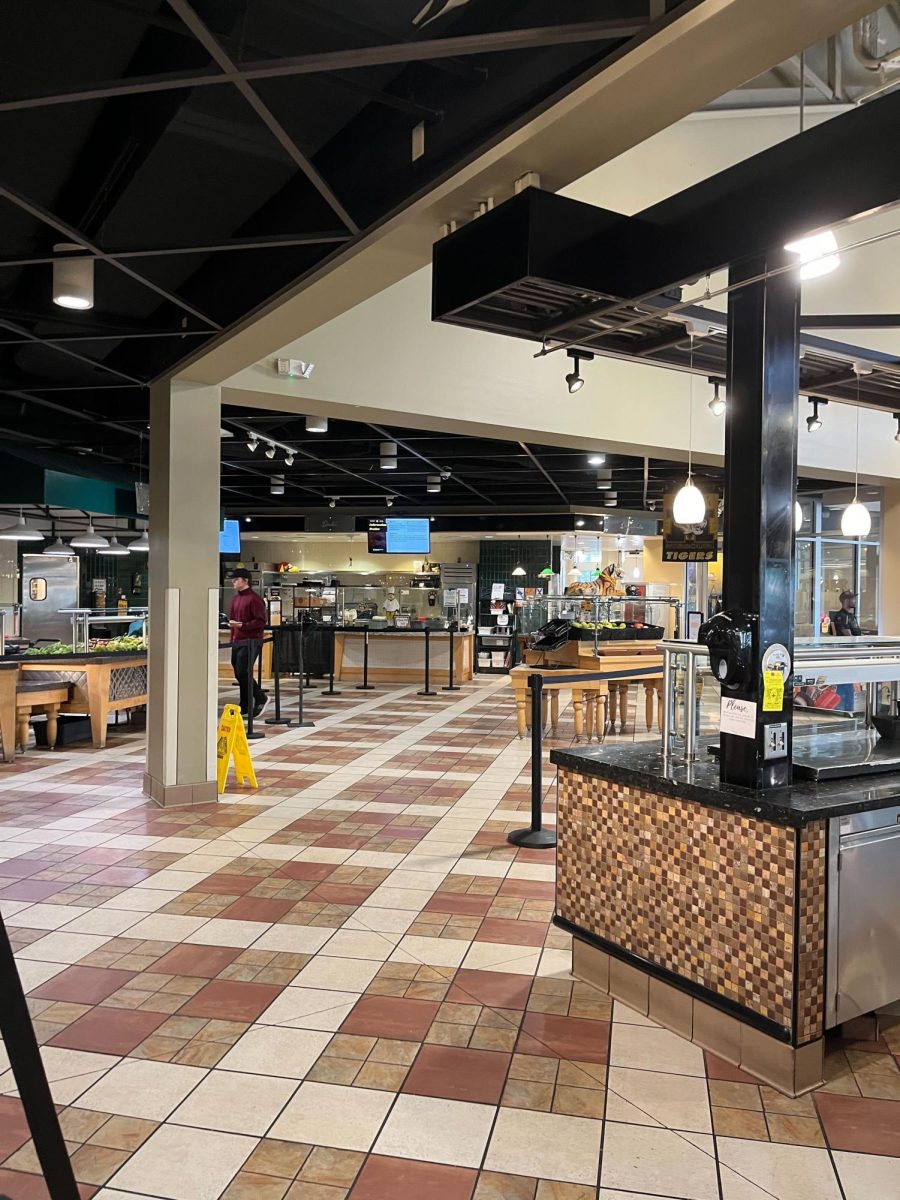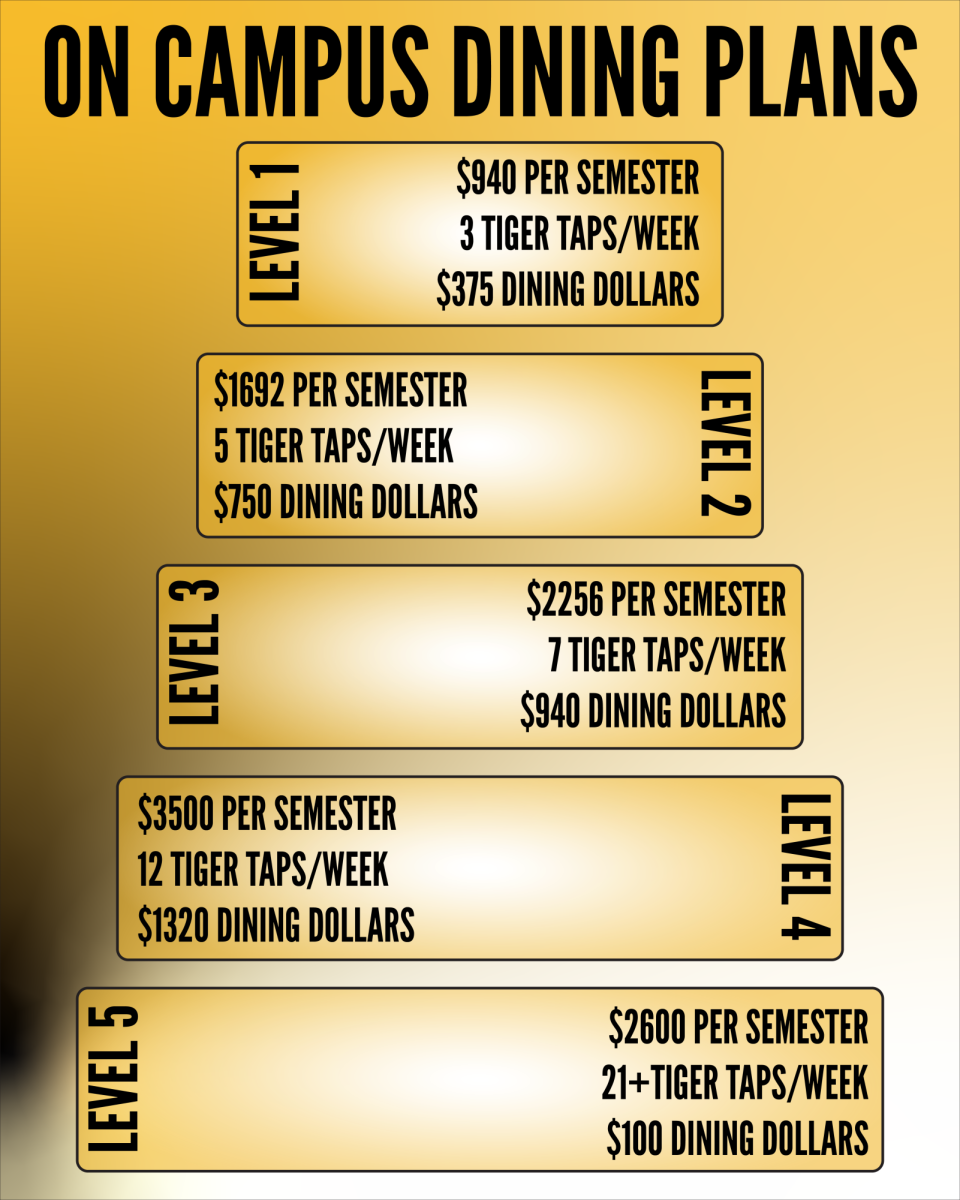CDS will change dining plan structure and cut discounts for 2025-26 school year
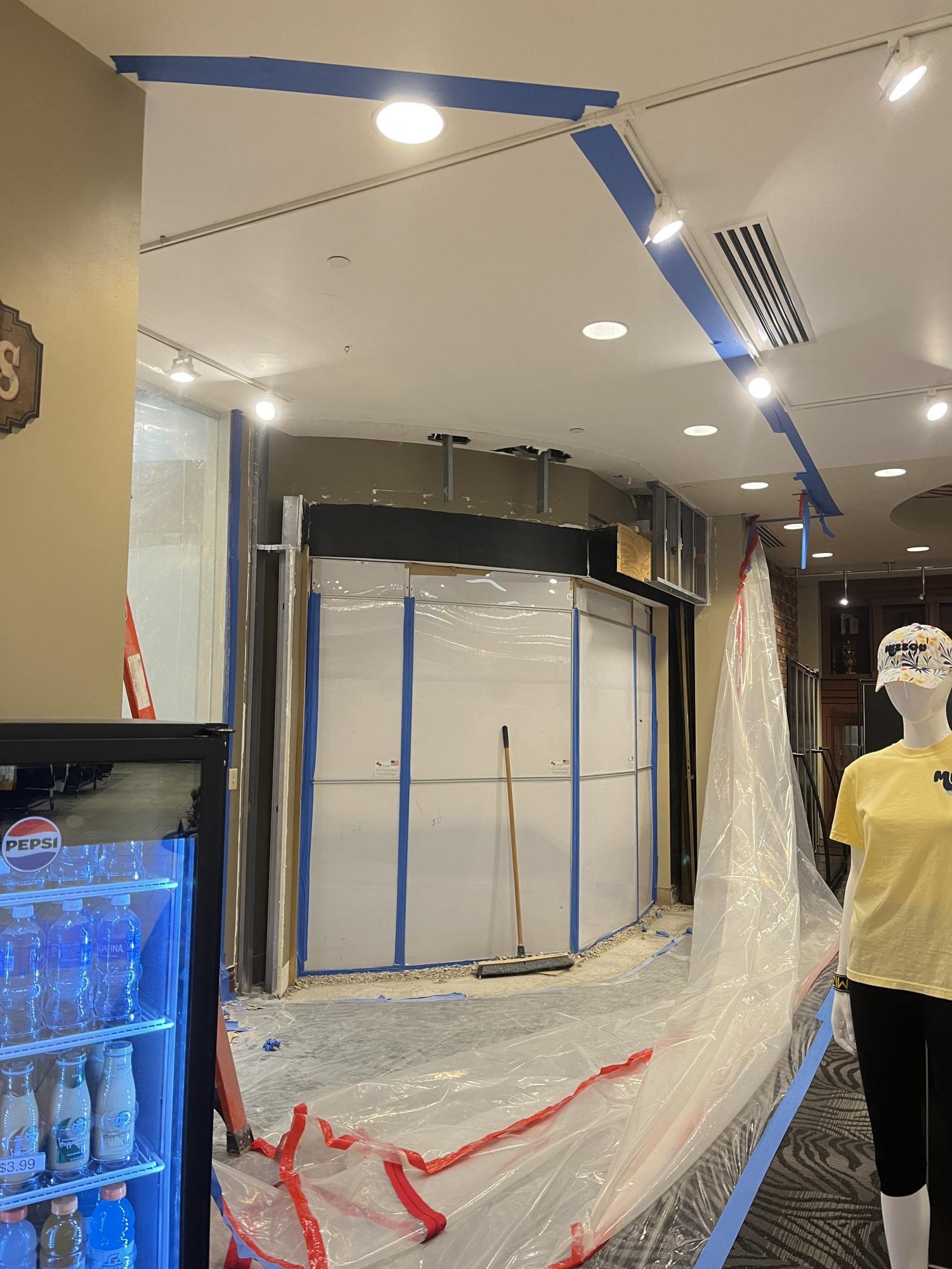
The Maneater’s investigation into campus dining services began in the Fall of 2024.
The project began with journalists inspecting food safety performance at dining locations across MU. It then pivoted into a full-length investigation regarding employees’ satisfaction, changes implemented to the dining plans provided and more.
As these topics remain relevant heading into the 2025-2026 academic year, The Maneater provides a view into the university’s internal affairs for our readers to consider.
The following section is not an exhaustive list of student employment opinions.
In 2024, 300 student employees and roughly 100 full-time employees worked for Campus Dining Services at the University of Missouri.
Student employees have had various experiences regarding their employment with Campus Dining Services.
First-year student Stella Thrift, a student employee at Plaza 900 Dining and Emporium Market, said that in the weeks she has worked there, there have been issues with scheduling changes.
“They have gotten me to try to work days that I couldn’t do because they’re understaffed,” Thrift said.
Senior Varsha Kuchana, an international student from India who works in the MU Student Center, said she believes that the MU Student Center isn’t as flexible with its scheduling.
“I’ve fallen sick a few times, so when I asked for leave, like, they made a big fuss about it, saying that you took us so many leaves, and, yeah, they complained about me,” Kuchana said.
Senior Varshith Pulluri, a student employee in the MU Student Center, said he had a frustrating encounter with his boss when they changed his schedule.
“I’ve emailed them that I can’t work on Friday. The response was so rude that ‘if you want to work, you can or else you can just leave.’ That was what I got from them,” Pulluri said.
He also reported that he has faced complicated work dynamics.
“They don’t like some people, like [a] kind of favoritism,” Pulluri said. “So one of my friends changed her shift on Fridays. They were like, okay, ‘we can change your shift on Friday,’ but not mine, I don’t know why that happened.”
Despite mentioning some issues she has had, Thrift said in her experience, scheduling has been pretty flexible.
“They’re pretty adaptable with your schedule. Like if you can’t work a day, then someone else can pick up your shift that day. You do have to make it up like sometime in the week, which kind of sucks. But it’s not like a horrible job to have,” Thrift said.
Ian De Smet, a former MU student and labor protest organizer with Mizzou Young Democratic Socialists of America, worked at Pizza & MO in 2022. In his experience, he said that the scheduling changes had taken a toll on his mental health.
“On multiple occasions there were other emergencies and situations in which they called me back, or they held me back there longer, and I would stay until 1 a.m. or 3 a.m. It was awful for my mental health,” De Smet said.
During his time working with the Mizzou Young Democratic Socialists of America, De Smet joined a protest against CDS.
“The issue of campus dining had been something brought up even in the first meeting that we ever had, so once [Quinn Coffman] laid out the plan for us and we voted on it and decided to commit to a campaign to raise the minimum wage of campus dining workers,” De Smet said.
Like De Smet, Kuchana said she feels CDS employees deserve higher wages depending on their work ethic.
“It’s an average amount to give someone who’s working that hard, but they could improve because, like other sectors, it’s more pay for less work, but here we do more work and get less paid,” Kuchana said.
Kuchana said that despite the issues she has faced, she would recommend the experience to other students. Kuchana also commented how she still believes that CDS is beneficial work experience, despite the issues she addressed.
“I would definitely recommend it, because it will be an experience for [students] to know what’s happening, and how to receive customers and everything,” Kuchana said.
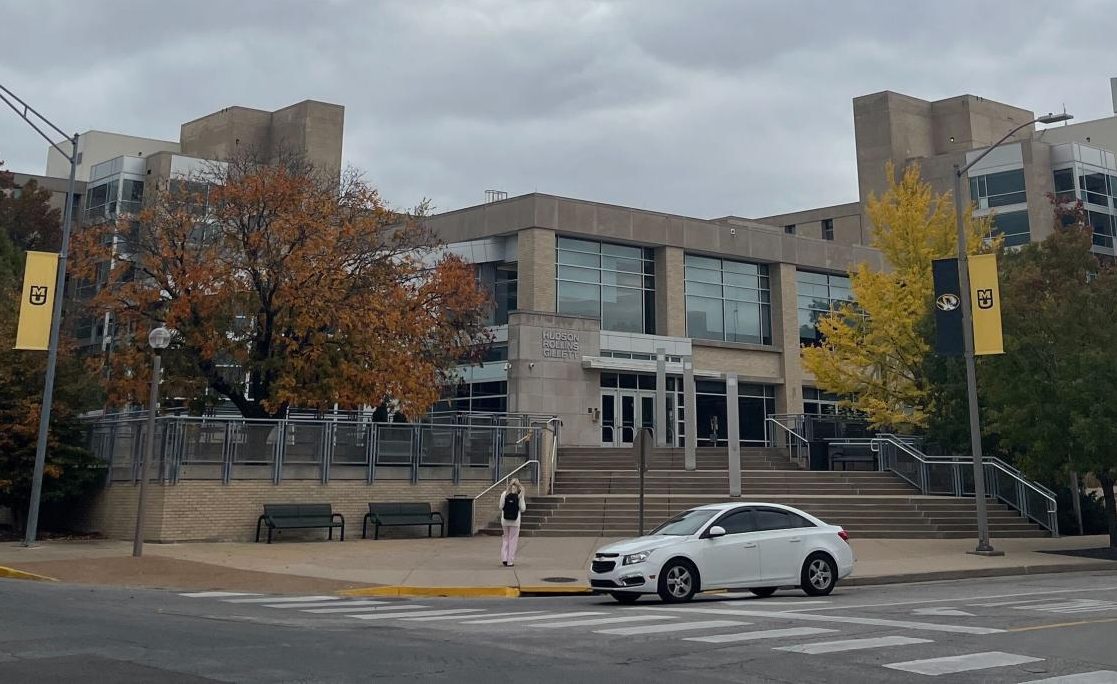
Proposition A, which took effect on May 1, raised the minimum wage for Missouri workers from $12.30 to $15 an hour by 2026. Public universities are exempt from the mandatory wage increase.
“The university, while having that leeway, shouldn’t take advantage of it,” Ian de Smet, a University of Missouri student and a former Campus Dining Services employee, said. “The minimum wage is there to set a standard.”
On its current application page, CDS states that it offers competitive pay for students at $13.75 an hour. According to MU Deputy Spokesperson Travis Zimpfer, the university is planning to increase CDS employees’ wages to make them competitive under the new state minimum wage.
When De Smet worked as a supervisor at Pizza & MO in 2022, his hourly wage was $11.90 an hour. This was 75 cents over the Missouri minimum wage at the time, but De Smet said he still struggled to afford amenities and housing as a student employee.
“I was doing very similar work that other people were doing at Chipotle or Sunshine Sushi,” De Smet said. “It was a lot of comparing the conditions that we were in to that of other workers in a similar field and seeing what they were getting paid versus what we were.”
Students De Smet met while working for CDS eventually organized under the Mizzou Young Democratic Socialists of America (YDSA) to protest their working conditions and wages. Members of the student organization “salted” campus dining locations, meaning they entered workspaces as employees with the intention to organize other student employees.
“There’s this taboo, right, in work spaces … You don’t really talk about how much you get paid,” De Smet said. “But once you were there in the trenches with the grease against your face and the noise and the yelling and the buzzers and everything, everybody, everyone, regardless of what the politics were, what their gender was, what year they were, everyone was like ‘we do not get paid enough for this.’”
In the Spring 2023 semester, YDSA’s student organizing culminated in a protest at Plaza 900 backed by a petition with over 2,000 signatures. According to Travis Zimpfer, there were no changes in CDS administration after YDSA delivered its petition to the CDS director in Spring 2023.
As a supervisor at Pizza & MO, De Smet observed management dismiss his and other student supervisors’ concerns about repairs needed for deep-frying equipment.
“The student management was the only management that was on site,” De Smet said.
For these kinds of concerns to be addressed, undergraduate student employees across MU tend to organize through groups like YDSA.
“With students, the turnover rate is high. We just don’t have the capacity to organize them,” Luke Fennewald, a union representative for MU employees at LiUNA Local 955 said.
LiUNA represents about 765 employees on Columbia’s campus, but the impact of their negotiating extends to non-union university employees and throughout the University of Missouri system.
In April of 2025, LiUNA began wage negotiations with the university administration to address system-wide wage compression. Full-time employees with specialized skills and long tenure are being paid less than or the same as employees hired within the last few years.
LiUNA’s initial proposal was for a $19 an hour minimum wage – an annual gross income of $39,500 – and a five percent cost of living adjustment for employees already earning above that margin. After starting negotiations with the university, LiUNA reduced the concessions it was asking for.
“The workers should be able to sustain themselves on the wages given by the university,” Fennewald said.
The union chose $19 an hour because it’s above many assistance programs’ maximum income for eligibility. In a survey conducted by the union, most members said they would find $19 to $20 an hour a reasonable minimum wage.
“I don’t think, especially campus dining, has been competitive in their wages,” Fennewald said. “[It’s] why they are relying on a lot of student workers. So [bargaining] would make it to where they are competitive in that labor market.”
According to Travis Zimpfer, CDS employs approximately three times as many student employees as non-student employees. Salaries for full-time food service workers in CDS depend on a person’s level of skill, graded from one to four, with four demonstrating the highest level of skill.
Wage data from the St. Louis Post-Dispatch suggests discrepancies in this system. There are several Food Service Worker I or II employees who earn substantially more than employees with a higher grade of skill.
The date these employees were hired is not listed, making it unclear if the difference in wages is due to their length of employment.
“This really brings morale down … a lot of 20-year people are disappointed when they find out what people who have not been here long make,” said Kevin Jordan, a full-time CDS employee with over two decades of experience at the institution. “[In] at least my first 20 years, at least eight times, they said no raises.”
According to Fennewald, MU employees can receive raises through labor market adjustments and annual recognition of merit. Raises based on merit are the most common type of salary increase at MU and are determined at the university’s discretion.
The merit system was introduced in 2014 to put greater weight on employee performance when determining salary increases. Evaluations are performed by supervisors and reviewed by management, but employees are not guaranteed a raise if they perform successfully or above established expectations.
“If the department doesn’t have that much for raises, people might only get one percent, or nothing,” Fennewald said.
While bargaining with the university, he observed that the merit raise tends to be about two percent of an employee’s salary if a department has adequate funding.
“It seems every year health care costs are going up, health insurance specifically,” Fennewald said. “Any raise that [employees] got seems to be just eaten up by that.”
In early March 2025, all CDS employees received a wage increase based on current market conditions. Fennewald, who is responsible for negotiations with the university, said LiUNA wasn’t notified of the raise before its implementation.
In a letter received by CDS employees, workers were notified of their raises and reminded of their at-will employment status. At-will employees can be let go by the university “at any time, with or without cause.”
“I think that generated a lot of fear … because that seems like an odd thing to include in something that is announcing a raise,” Fennewald said. “[The raise] did not do a whole lot to affect the wage compression we’re seeing.”
Employee Kevin Jordan appreciated the surprise but is now concerned the annual merit raises in September will be lower than usual.
Higher costs and changes to the MU dining plan system for the upcoming academic year were made to better accommodate student dining preferences. Whether the system’s restructuring will support higher and more proportional wages for CDS employees in the future is uncertain.
“Restaurants are all very similar skill sets,” Fennewald said. “So, if campus dining isn’t keeping up with the competition in Columbia, then a lot of people will end up moving.
The University of Missouri is removing the discount system for dining halls and restaurants. For students on the Gold Plan, which is the standard dining option that all freshmen on campus are automatically signed up for, students pay $1760 per semester and receive $875 to spend for that semester. The other half of that payment goes toward administrative fees. According to the Campus Dining Service website, the administrative fee goes towards “building maintenance, salaries, utilities and other overhead costs and is non-refundable.”
Next year, students will no longer pay an administrative fee. Instead, they’ll pay for tiger taps and a higher dining balance. The standard Gold Plan for 2024-25 cost students $1,760 per semester, whereas the standard Level Three plan for 2025-26 is set to cost $2,256 per semester. According to the notes from a public MU System Board of Curators meeting, the cost per meal will increase by 5.5%. The Level 1 plan, however, which is the cheapest option for the meal plan for 2025-26, will be $160 dollars cheaper than the Silver Plan, the cheapest option for 2024-25.
According to Travis Zimpfer, deputy spokesperson for MU Media Relations and Public Affairs, CDS is removing the administrative fee to make the dining plans clearer.
“We’re introducing a clearer and more consistent pricing model that’s consistent across CDS,” Zimpfer said. “Students and parents found the administrative fee confusing, so we’re eliminating that administrative fee.”
In the 2024-25 school year, there were three levels of dining plans for any full-time MU student, regardless of whether they live on or off campus. Returning students who live on campus were automatically signed up for the Gold Plan, but could opt out of a dining plan. First-year students were automatically signed up for the Gold Plan, which they could adjust down to the Silver Plan or up to the Platinum Plan as needed. In the 2025-26 school year, there will be five levels of plans exclusively for on-campus students and two levels exclusively for off-campus students.
There will be price changes for the dining plans as well. The standard Gold plan for 2024-2025 cost $1,760 per semester, whereas the standard Level 3 plan for 2025-2026 is set to cost $2,256 per semester. According to the notes from a public MU System Board of Curators meeting, the cost per meal will increase by 5.5%. The Level 1 plan, however, which is the cheapest option for the meal plan for 2025-26, will be $160 dollars cheaper than the Silver Plan, the cheapest option for 2024-25.
The new dining plan system consists of both Tiger Taps and Dining Dollars. Tiger Taps are credits that can be exchanged for a meal at certain CDS locations and reset weekly.
Dining Dollars can be used at any CDS location and will function the same as the dining plan for the 2024-25 school year. Students will also receive a number of Tiger Taps per week determined by their plan.
For Levels 1-4 of the dining plan, Tiger Taps can be used at the dining halls, alongside Baja Grill, Mort’s, Savor Kitchen and Wheatstone Bistro. The Ultimate Plan, which is priced between Levels 3-4 at $2,600 per semester, provides the greatest number of swipes per week but comes with the fewest Dining Dollars and limits where Tiger Taps can be used. Unused Tiger Taps expire at the end of the week.
The following editors contributed to the editing process of this investigation:
Julianna Mejia | [email protected]
Stella Spragg and Natalie Kientzy | [email protected]
Chase Pray | [email protected]



